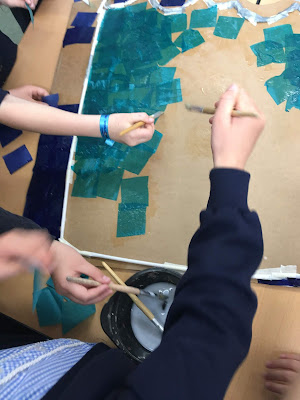With the final two sessions having been delivered in the museum for St. Luke’s Church of England primary school, we reflect back on the Eco-plastic Detective Cultural Hub project and examine why it has had such an impact with our local schools.
 |
| Pupils being Eco-plastic Detectives - image credit St Luke's C of E Primary School |
To bring you up to date, and since my last blog post, we have delivered 17 sessions to 476 local school children…phew! And I must say we’ve had a bit of an impact.
The art workshop days - led by the ever-popular artist Darrell Wakelam – were hosted in two local schools, allowing more children to get their sleeves rolled up and get stuck into a quality arts project.
 |
| Pasting the sea into the water bottle collage |
 |
| Sides of the recycling bin with happy fish swimming in a clean sea |
Inspired by objects from MoDiP’s handling collection - namely a whale, a Manta ray and a turtle (yes, really…see the images below) the children fashioned fish and sea creatures to feature in and decorate a massive, over-sized water bottle collage and a big single-use plastics recycling bin to be used in their schools.
 |
| https://www.modip.ac.uk/artefact/aibdc-0081951 |
 |
| https://www.modip.ac.uk/artefact/aibdc-0081952 |
 |
| https://www.modip.ac.uk/artefact/aibdc-0081953 |
The idea behind these being, if we recycle our single-use plastics our oceans will be happy and healthy, and if we don’t…they won’t. A simple message, but a powerful one, and one that children can relate to and play their part in on a daily basis, in their everyday lives.
Looking at the feedback from the Eco-plastic Detective sessions, it is clear that the objectives of the project – to learn about different types of plastics and how they can be recycled, as well as objects made from upcycled, recycled and plant-based plastics – have been met.
Comments from the children at the end of their sessions, when asked what new thing they had learnt about plastics include:
 |
| Pupils being Eco-plastic Detectives - image credit St Luke's C of E Primary School |
Comments from the children at the end of their sessions, when asked what new thing they had learnt about plastics include:
I didn’t know that a plastic chair could be made of wool.
I didn’t know that my cardigan is made of plastic.
I just thought plastic was one thing – now I know there are different types of plastics.
I didn’t know that plastic toys could be recycled into something else.
I didn’t know bouncy castles could make other things – like a pencil case.
I found out that Lego can be made from sugar cane.
So, there we have it. The evidence. This project - Eco-plastic Detective, backed and funded by Dorset’s Cultural Hub - has passed its parole and can be released to freely inspire good behaviour, with regards to our plastics well into a happier, healthier future.
 |
| Illustration by Martin Brown |
Eco-plastic Detective project resources are available to download here: https://www.modip.ac.uk/engagement/schools/eco-plastic-detective
Julia Pulman
Museum Engagement Officer

No comments:
Post a Comment
Note: only a member of this blog may post a comment.